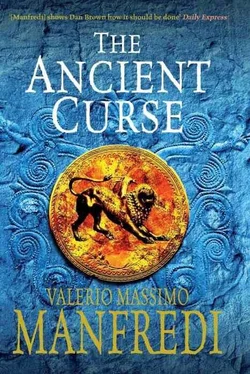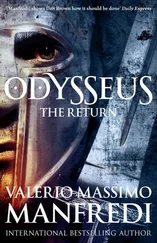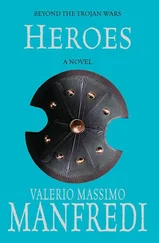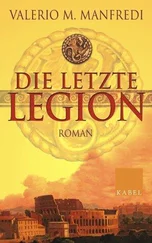Turm Kaiknas fought with superhuman strength. He had no other reason for being, in the short time that remained for him to live, than to cover his enemy with contempt and make sure that his blood fell on all those who witnessed his martyrdom. He struck the beast, wounding it again and again, but when he fell, lifeless, the monster was still alive and still tearing at his inanimate body.
Lars Thyrrens proclaimed that this was proof of Turm Kaiknas’s guilt and he ordered the Phersu buried with the live animal, in the same tomb, so that the beast could continue to torture him for all eternity. An isolated tomb was designated for his burial, built in a solitary place, with no markings other than that of the black moon.
Aule Tarchna exercised his right to introduce an image of the family inside the tomb so that there might be a benevolent presence in that lair of cries and darkness, and he had a cenotaph fashioned in solid alabaster, portraying the likeness of Anait. Then he commissioned a sculpture of Velies that would be placed in the family tomb. A great artist cast the boy’s likeness in bronze and included the blade that had murdered him. The portrait was the picture of melancholy and pain in a shape more similar to a shadow than to a living child, of a soul that had inhabited his body for too short a time and would never know the joy of love or of a family.
Inside the tomb he placed, last of all, two slabs of bronze, on which his eternal curse was inscribed:
May you be damned seven times, Lars Thyrrens, may your seed be damned and may all those who in this city sated your thirst for power be damned with you, may they be cursed until the end of the nine ages of Rasna. Damn the beast and damn all those who witnessed the cruel murder of an innocent man. May they experience the same end suffered by a blameless hero and may they weep tears of blood…
Fabrizio awakened soaked in a cold sweat, filled with a sense of anguish. He stumbled to his feet with difficulty and went to the window. It was pitch dark outside.
LIEITENANT REGGIANI’S Alfa Romeo pulled up in front of the Semprini farmhouse just before eight. Fabrizio came to open the door and invited his visitor to sit down in the kitchen. The coffee was already perking and bread was toasting in the oven. Reggiani wore jeans and a dark blue suede jacket which did not quite disguise the bulk of the regulation Beretta nestled under his armpit. He sat and watched Fabrizio from the corner of his eye as he took the bread out of the oven and set out butter, jam and honey.
‘You are scary-looking,’ he said. ‘Looks like you spent the night in hell, actually.’
‘Yeah, well, I guess you could say that,’ replied Fabrizio without much emotion. He poured the coffee and sat down. ‘Take more if you like,’ he said. ‘There’s a full pot.’
‘Aren’t you going to tell me what happened?’
‘I worked for hours and hours – all night, actually – without ever taking a break. That’s why I must seem a little out of it.’
‘That much I know. My guys are posted outside twenty-four seven. Nothing else to report?’
‘Nothing else.’
‘So what have you concluded after all this work?’
‘I’ve translated Balestra’s inscription, but no one is to know that. I just needed to understand what it said.’
‘Can you let me in on it?’
‘Not yet.’
‘So why did you call me?’
‘Because I need you to come with me. To the tavern at Le Macine.’
‘To see that woman.’
‘Yes. I want to ask her what Montanari couldn’t tell me in time, before… that thing ripped out his throat.’
‘Which is?’
‘Where the seventh fragment of the inscription is.’
‘And that’s something that should interest us? Aside from its purely archaeological value, that is.’
‘No. I wouldn’t have knocked myself out this way for that reason. Archaeology takes time, usually. Do you know who that woman is?’
‘Yes. I’ve looked into it. She’s a widow who runs the place and usually serves at the bar. A normal person.’
‘Does this normal person have a name?’
‘First and last. It’s Ambra Reiter.’ Reggiani finished the last sip of coffee and lit up a cigarette.
‘It’s an early one today,’ observed Fabrizio as he put the cups in the sink.
‘I’m tense, all right? I’m preparing for the operation. You do remember I promised you no more than two days?’
Fabrizio didn’t reply. He dried his hands on a dishcloth and said, ‘Shall we go, then?’
Reggiani got up and went out to the car. Fabrizio locked the door behind him and slid into the passenger seat. ‘She has a strange name,’ he said. ‘What else do we know about her?’
Reggiani turned on to the regional road. ‘Not much for the time being. She’s been here for about five years and for a while she worked as a housekeeper in a house here in Volterra. I’m trying to find out where she’s from but I haven’t got very far yet. I’ve heard she dabbles in magic – innocent stuff, reading palms, tarot cards, that kind of thing.’
It took them longer than Fabrizio expected because Reggiani’s car was very low to the ground and he had to slow down at every bump and pothole. He seemed to be taking his time, driving slower than necessary. Maybe he wanted to allow time for conversation, but Fabrizio was quiet most of the way, absorbed in his thoughts, and his companion did not disturb him.
When they arrived in the courtyard at Le Macine the place was deserted. A northerly wind had cleared the morning mist and was scattering the dry oak and maple leaves, along with scraps of newspaper and bits of cement bags. A heap of freshly moved earth sat at the end of the courtyard near a digger, along with piles of bricks on one side and bags of cement and lime on the other, piled behind a fence of corrugated sheet metal.
‘Work in progress, I see,’ commented Reggiani. ‘Business must be going well.’
He got out of the car and walked towards the building, followed by Fabrizio. He knocked on the door, which swung open at the touch of his hand. They entered and looked around in the semi-darkness. The room was empty, the chairs upside down on the tables, the stagnant air saturated with an indefinable smell in which one could make out a whiff of incense mixed with the aroma of some exotic cigarette.
‘Anyone here?’ asked Reggiani. No answer. ‘Anyone around?’ he repeated, raising his voice.
‘Wait,’ said Fabrizio. ‘I’ll take a look in the kitchen.’
He went behind the counter and inspected the room at the back. The stovetops were clean, the floor had been washed, the back door was locked and bolted.
He called out again, ‘Is there anyone here?’
A spooked cat raced between his legs, miaowing loudly, crossed the room in a flash and escaped outside.
‘Strange, isn’t it?’ said Reggiani. ‘Looks like no one’s here, but the door was open… Listen, I say we come back later. I don’t like being in other people’s houses when they’re not around. Even though I’m in plain clothes, I’m still a carabiniere officer and-’
‘Did you call?’ a voice suddenly rang out behind them.
They spun around and found Ambra Reiter, who had seemingly materialized out of nowhere. She was standing still in the middle of the room and her face was wan but showed no emotion.
‘I’m Lieutenant Marcello Reggiani,’ said the officer with a bit of embarrassment, ‘and I think you’ve met this fellow here, Dr Fabrizio Castellani of the University of Siena.’
The woman shook her head slowly as if awakening from a dream. ‘I’ve never had the pleasure. Nice to meet you. Ambra Reiter,’ she added, extending a hand.
Читать дальше












